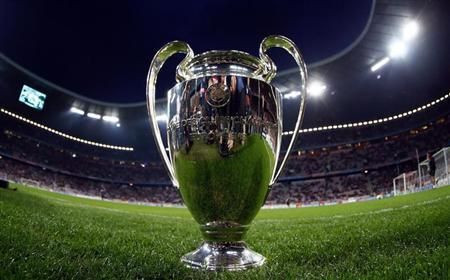Investigators Expose Global Soccer Fixing Scam

Hundreds of soccer matches have been fixed in a global betting scam run from Singapore, police said on Monday, in a blow to the image of the world's most popular sport and a multi-billion dollar industry.
About 680 suspicious matches including qualifying games for the World Cup and European Championships, and the Champions League for top European club sides, have been identified in an inquiry by European police forces, the European anti-crime agency Europol, and national prosecutors.
"This is a sad day for European football," said Rob Wainwright, director of Europol. "This is now an integrity issue for football. Those responsible for running the games should hear the warnings."
The world's most popular sport, soccer is played on every continent. The World Cup and Europe's Champions League are beamed worldwide and generate billions of dollars for national associations, clubs and broadcasters.
Top players such as Lionel Messi of Barcelona and Argentina and Cristiano Ronaldo, a Portuguese international who plays his club soccer for Real Madrid, are household names.
The matches in question, some of which have already been subject to successful criminal prosecutions, were played between 2008 and 2011, the investigators said. About 380 of the suspicious matches were played in Europe, and a further 300 were identified in Africa, Asia, and Latin America.
Corruption linked to Asian betting syndicates and organized crime has long been seen as a threat to the game, but Monday's announcement underlines the scale of the problem.
Ralf Mutschke, Director of Security for world soccer's governing body FIFA, said sports bodies and prosecutors needed to work more closely together.
"The support of law enforcement bodies, legal investigations, and ultimately tougher sanctions are required, as currently there is low risk and high gain potential for the fixers," said Mutschke, a German former police officer.
Criminal gangs are believed to be involved in match-fixing networks, using them as a way to launder cash. Last year, the head of an anti-corruption watchdog estimated that $1 trillion was gambled on sport each year -- or $3 billion a day -- with most coming from Asia and wagered on soccer matches.
SINGAPORE CONNECTION
A German investigator described a network involving couriers ferrying bribes around the world, paying off players and referees in the fixing which involved about 425 corrupt officials, players and serious criminals in 15 countries.
"We have evidence for 150 of these cases, and the operations were run out of Singapore with bribes of up to 100,000 euros paid per match," said Friedhelm Althans, chief investigator for police in the German city of Bochum.
Singapore police said last month that they were helping Italian authorities to investigate alleged soccer match fixing involving a Singaporean, but said he had not been arrested or charged with any offence there.
German investigators said international matches were implicated as were games in Turkey, Germany, Switzerland, Belgium, Croatia, Austria, Hungary, Bosnia, Slovenia and Canada. Suspicious games had also been identified in Africa, Asia and Latin America.
Fourteen people have already been convicted in Germany in connection with the investigation.
Austrian prosecutors are investigating 20 people, including players, on suspicion of fraud and money laundering linked to fixing and betting on soccer matches, a spokesman for prosecutors in the city of Graz said.
Investigators said no names of players or clubs would be released while the investigation proceeded. However, the fixing also included top flight national league matches in several European countries, as well as two Champions League matches, including one played in Britain.
UEFA, European soccer's governing body, said it expected to receive further information from Europol in the coming days.
"As part of the fight against the manipulation of matches, UEFA is already cooperating with the authorities on these serious matters as part of its zero tolerance policy towards match-fixing in our sport," it added.
England's Football Association said it was not aware of any "credible reports into suspicious Champions League fixtures in England."
Soccer has been affected by bribery scandals in the past, with the English game suffering in the 1960s and Italian soccer hit by a series of fixing cases in recent years.
The growth of televised sport and technology that allows gamblers to bet during a match have created fresh opportunities for fraudsters with links to organized crime.
Corruption goes beyond soccer. Three Pakistani international cricketers were jailed in Britain in 2011 for their part in a scam where players agree to rig a specific part of a game, so-called "spot fixing".
TIP OF THE ICEBERG
Althans said that while German police had concrete proof of 8 million euros ($11 million) in gambling profits from the match fixing, this was probably the tip of the iceberg.
Investigators described how gang members immediately subordinate to the Singapore-based leader of a worldwide network were each tasked with maintaining contacts with corrupt players and officials in their parts of the world.
Laszlo Angeli, a Hungarian prosecutor, gave an example of how the scam worked. "The Hungarian member, who was immediately below the Singapore head, was in touch with Hungarian referees who could then attempt to swing matches at which they officiated around the world," he said.
Accomplices would then place bets on the internet or by phone with bookmakers in Asia, where bets that would be illegal in Europe were accepted. "One fixed match might involve up to 50 suspects in 10 countries on separate continents," said Althans.
"Even two World Cup qualification matches in Africa, and one in Central America, are under suspicion," Althans added.
(Reuters)
© Copyright IBTimes 2024. All rights reserved.






















